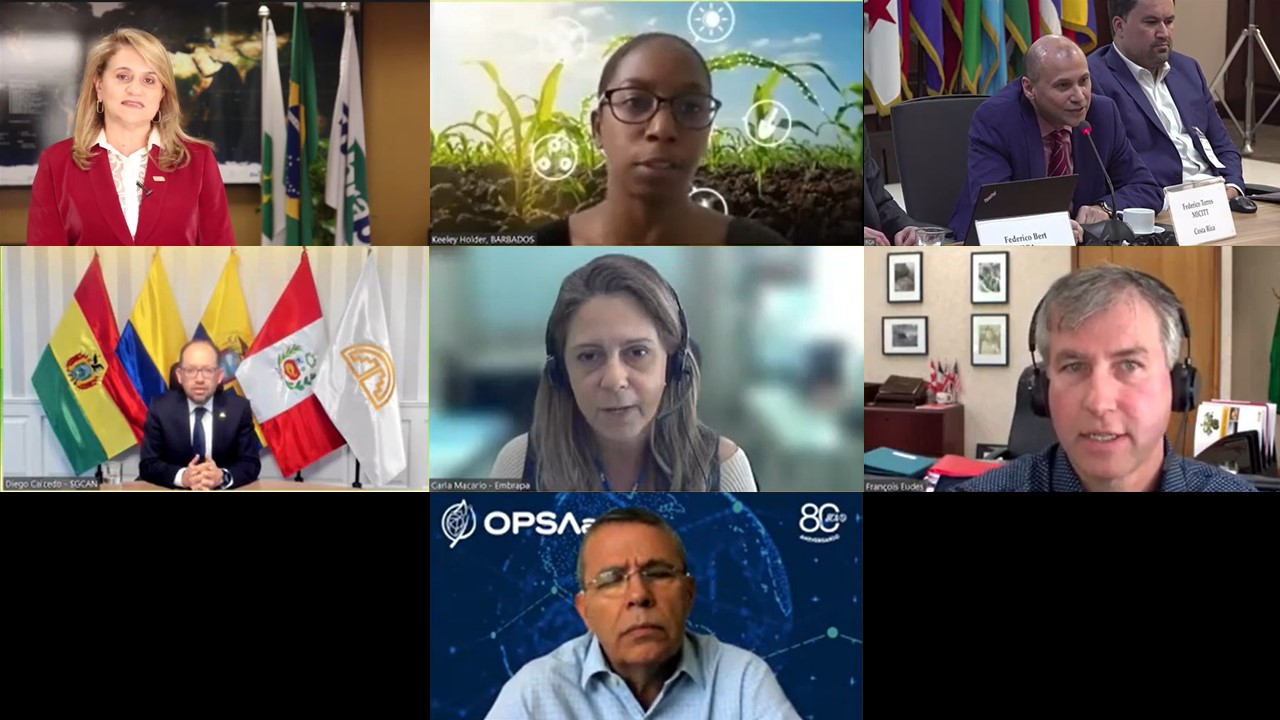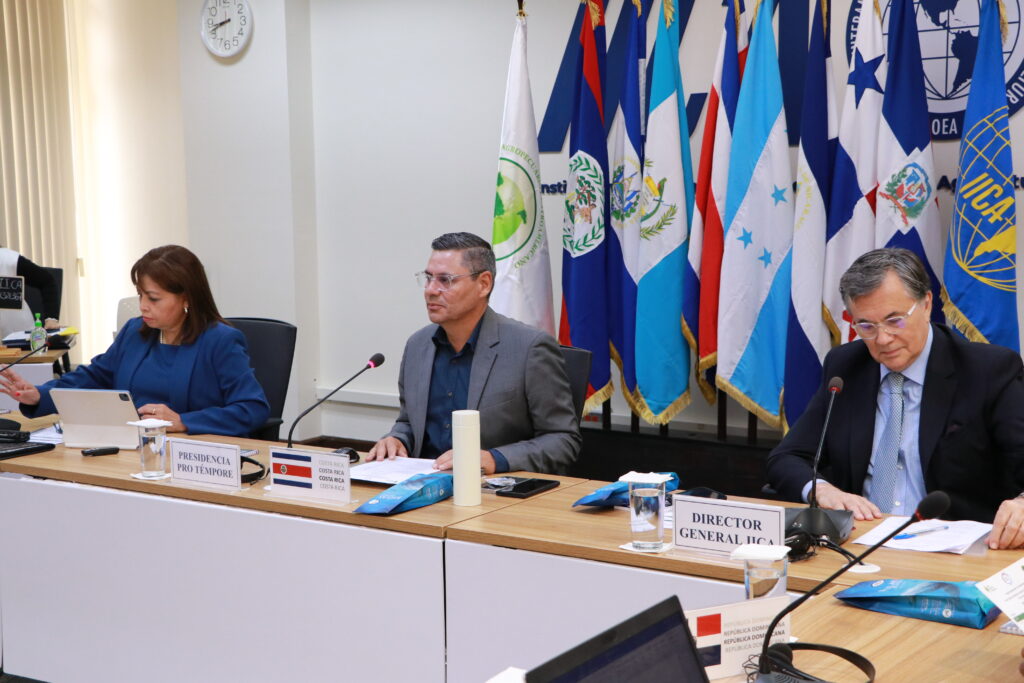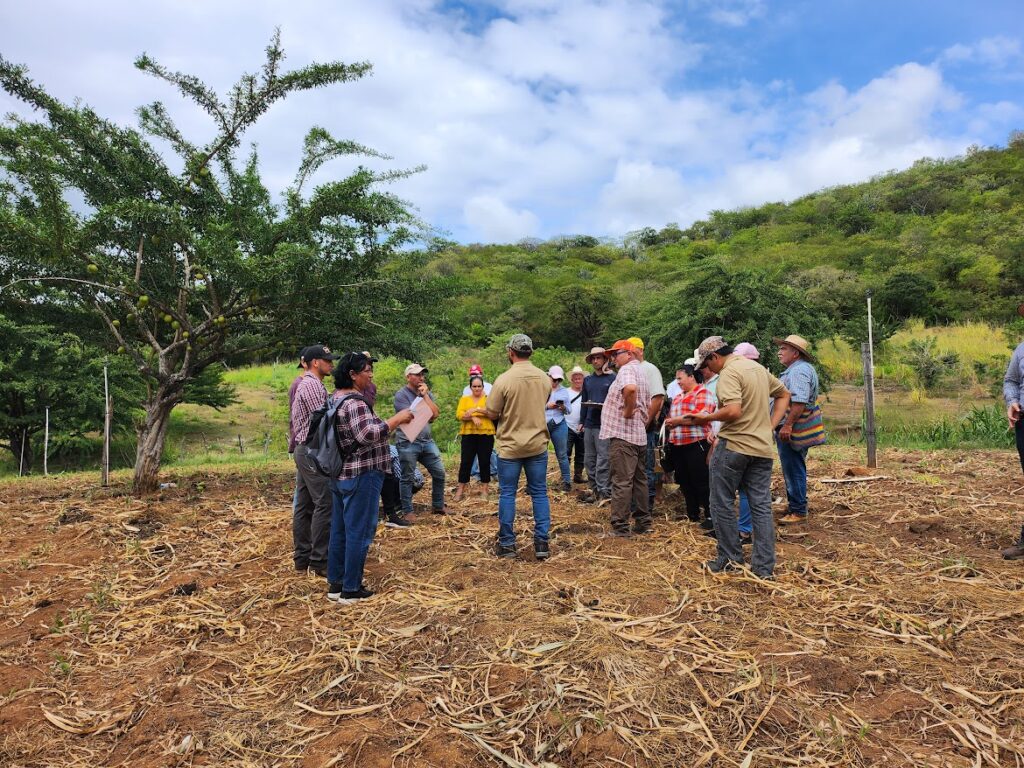Representantes de distintos gobiernos dieron detalles de los programas que llevan adelante en el continente durante el panel “Digitalización agroalimentaria: Iniciativas y políticas públicas en países de las Américas”, que tuvo lugar en la segunda edición de la Semana de la Agricultura Digital.

San José, 31 de mayo de 2023 (IICA) – Países de las Américas están desarrollando nuevas políticas públicas para llevar más innovaciones y nuevas tecnologías a la agricultura, con la finalidad de hacerla más productiva y sostenible y mejorar la calidad de vida en las zonas rurales.
Representantes de distintos gobiernos dieron detalles de los programas que llevan adelante en el continente durante el panel “Digitalización agroalimentaria: Iniciativas y políticas públicas en países de las Américas”, que tuvo lugar en la segunda edición de la Semana de la Agricultura Digital.
Este encuentro de trabajo, con participación presencial y virtual de actores de los ámbitos público y privado, se realiza en la sede central del Instituto Interamericano de Cooperación para la Agricultura (IICA), en San José de Costa Rica.
La Semana de la Agricultura Digital es un foro destinado a promover una digitalización agroalimentaria dinámica e inclusiva en la región, organizado por el IICA junto a siete aliados estratégicos: el Banco de Desarrollo de América Latina-CAF, el Fondo Internacional de Desarrollo Agrícola (FIDA), el BID Lab y, desde el sector privado, Bayer, Microsoft, el Yield Lab y Veolia.
En el panel en el que se hizo un repaso a las iniciativas y políticas públicas que se están llevando adelante en las Américas participaron Silvia Massruhá, presidenta de la Empresa Brasileña de Investigación Agropecuaria (EMBRAPA); Keeley Holder, Jefa de Gabinete del Ministerio de Agricultura y Seguridad Alimentaria de Barbados; Federico Torres, Director de Innovación del Ministerio de Ciencia, Innovación, Tecnología y Telecomunicaciones de Costa Rica; Diego Caicedo Pinoargote, Secretario General de la Comunidad Andina; Carla do Nascimento Macario, Jefa de Agricultura Digital del EMBRAPA; y Francois Eudes, Director de Investigación del Departamento de Agricultura y Agroindustria de Canadá.
Además, el especialista técnico del IICA Joaquín Arias presentó el trabajo y los hallazgos en materia de digitalización de la agricultura en la región realizados por el Observatorio de Políticas Públicas del Instituto.
El desafío de llegar a todos
Massruhá, quien asumió este mes como máxima autoridad de EMBRAPA, institución pública que es referencia global en temas de investigación agropecuaria, dijo que las tecnologías de información y comunicación tiene un papel transversal en toda la cadena de producción agropecuaria en Brasil.
“EMBRAPA tiene más de 35 años de trabajo en temas de digitalización y hoy, con la incorporación de la bioinformática e inteligencia artificial, nos abocamos a distintas áreas y vemos cada vez más su importancia. De todas maneras, todavía tenemos muchos desafíos y uno es la dificultad de muchos pequeños productores para acceder a las nuevas tecnologías”.
Carla do Nascimento Macario reveló que solo alrededor del 30% de las áreas rurales de Brasil tienen acceso a conectividad, lo que trae dificultades, y consideró que no solo es necesaria la transformación digital, sino también capacitar a las personas.
Keeley Holder reveló que en Barbados se trabaja en una política de agricultura innovadora para generar un programa educativo y acercarse con nuevas tecnologías a los productores. “Pronto –anticipó- estableceremos un centro de innovación para la agricultura en Barbados, para el cual ya hemos comenzado a trabajar con apoyo del IICA. También vamos a generar un mapa digital del país con todas las zonas de producción, de manera de tener las herramientas que necesitaremos. Esperamos completarlo para finales de año”.
Caicedo Pinoargote contó la estrategia de digitalización que puso en marcha la Comunidad Andina, que reúne a Bolivia, Colombia, Ecuador y Perú. “Es una prioridad la transformación digital desde una perspectiva digital y de una manera holística. Es exponencial el crecimiento de la economía digital”, explicó.
Agregó que la digitalización de la agricultura sirve para fines disímiles, tales como contar con un control integrado de plagas y enfermedades y como elemento facilitador del comercio exterior.
Torres dio cuenta de los distintos aspectos del Plan de Ciencia, Tecnología e Innovación 2022-2027, que está ejecutándose en Costa Rica. “Tenemos indicadores, porque en política pública lo que no se mide no existe. Hemos trabajado para lograr que este modelo se implemente en todo el país”, afirmó.
También explicó en detalle las estrategias de transformación digital y de bioeconomía. “Las dos deben tener interacción e incorporar cuestiones como la ciencia de datos y el blockchain, para que el sector agro se transforme. Buscamos que las fincas de agricultura familiar accedan a la digitalización para lograr mayor productividad”, sostuvo.
Sobre Canadá, Eudes presentó el Plan Estratégico de Ciencia y Tecnología, que tiene un plazo de 10 años, y dio información sobre el crecimiento rápido en el ecosistema de innovación en ese país. “Existen nuevos actores y cada vez hay más complejidad y más desafíos, como el cambio climático o la inestabilidad del comercio”, admitió.
El representante del Departamento de Agricultura y Agroindustria canadiense agregó que es una prioridad del Estado llevar internet de calidad a las zonas rurales, especialmente en el norte del país, donde están las zonas más remotas. Finalmente, informó que se espera que las nuevas tecnologías no solo mejoren la productividad sino también que ayuden a entender mejor cómo funcionan las emisiones de gases de efecto invernadero de la agricultura y cuál es su huella de carbono.
Más información:
Gerencia de Comunicación Institucional
comunicacion.institucional@iica.int










